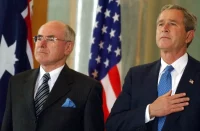The news that U.S. President Barak Obama would pay a visit to Israel this spring came as a surprise to Turkey — not least because U.S. Ambassador to Turkey Francis Ricciardone insisted that Turkey would be Barak Obama’s first stop in the Middle East after the U.S. elections.
At the beginning of Obama’s first term in spring 2009, he finished his first European tour in Turkey. At the time, the president remarked upon the exclusive nature of Washington’s relationship with Ankara. During his visit, Obama spoke before the Turkish Parliament with an address to the entire Islamic world, sending the message that the U.S. “views Turkey as a mediator between the West and the Islamic world.”
The change in itinerary is not only symbolic, but is also an indicator of the direction of U.S. policy in the Middle East. As such, Israeli newspaper Maariv wrote that Israel is becoming America’s most vital partner in the region, a change that became possible, according to The Washington Post, after the Arab Spring. Cumhuriyet, for its part, suggests that the Middle East is experiencing a historic reshuffling that is leading to increasing geopolitical chaos. As a result, an unexpected wild card has appeared: northern Iraq has practically become an independent Kurdistan that is preparing to integrate the Kurds of northern Syria. Cumhuriyet insists that this situation presents an opportunity for Israel to rise against the giant population of the Arab world and an Iran that is advancing in the nuclear sphere.
What next? According to Yeni Şafak, Washington, in planning Barak Obama’s first trip overseas, is departing from the established geopolitical order. As for the so-called “Islamic factor,” Yeni Şafak believes that he will turn his focus to other powerful governments like Indonesia, Pakistan, and Malaysia. Iranian expert Mohamed Reza Bahrami says that under a new strategy, the U.S. will shift its foreign policy priorities from the Middle East and Persian Gulf region to East Asia in order to contain China’s growing economic and military power.
Southeast Asia is of particular significance to the U.S. because it includes a huge Muslim population and the world’s largest Muslim country, Indonesia. Malaysia also occupies a special position in the Islamic world, as half of its population of 24 million is Muslim. These countries are following in the footsteps of other nations that consider themselves the original bearers of Islamic ideals. Indonesia and Malaysia have long claimed their rightful place in the hierarchy of the Muslim world. So, by leaving Israel as the preeminent power in the Middle East and plunging the region into geopolitical chaos, the U.S. has won itself the historic chance to create a new order in a different part of the world. For this reason, it is not difficult to guess where Barak Obama will be headed after his visit to Israel.
Source in Russian: IA REX
Translated by ORIENTAL REVIEW.














Comments